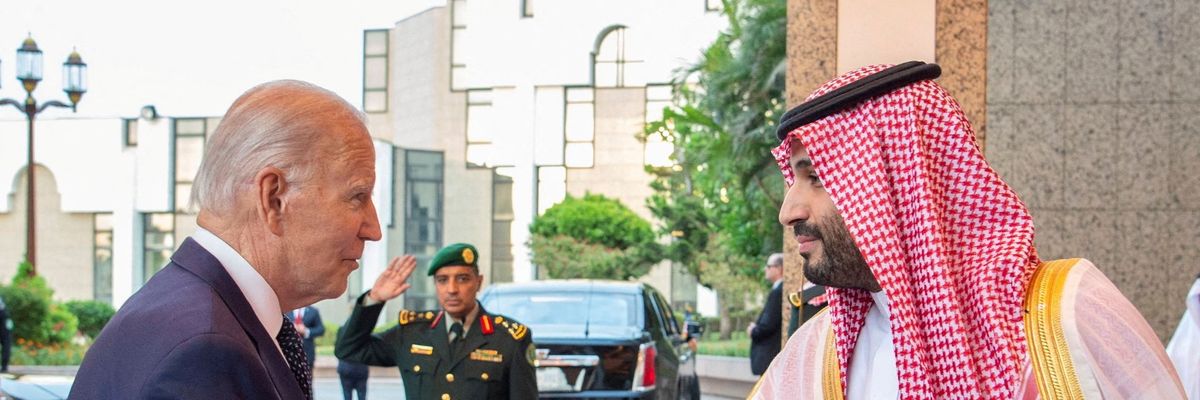Foreign meddling in the U.S. is all the rage. In just the past two weeks the Justice Department has issued multiple indictments and won a conviction related to the foreign influence campaigns of America’s adversaries.
While these are deeply troubling allegations of meddling in America by, in these cases, Russian and Chinese agents, America's authoritarian "friends" — including Saudi Arabia, Egypt, and the U.A.E. — have also been orchestrating illicit influence operations in the U.S. But, unlike Russia and China, they’ve faced little punishment for meddling in America.
On Wednesday, former Fugees rapper, Prakazrel “Pras” Michel, was convicted of orchestrating an elaborate influence operation on behalf of Malaysian financier Jho Low and attempting to extradite a Chinese government critic.
On April 17, 40 Chinese officials were charged with running a transnational repression scheme targeting Chinese dissidents in the U.S. and two Chinese operatives were arrested for allegedly acting as agents of the Chinese government and running a secret police station in New York City — just one of more than a hundred secret police stations the Chinese government allegedly operates in foreign countries. The very next day, on April 18, Russia was in the Justice Department’s crosshairs when four U.S. citizens and three Russian intelligence officers were accused of conducting an illicit foreign influence operation in the United States since 2015 that sought to “divide Americans and interfere in elections in the United States.”
The allegations in these indictments are deeply troubling and, unfortunately, are just the latest installments in ongoing campaigns by the Russian and Chinese governments to interfere in U.S. politics and elections. While the illicit influence campaigns of America’s adversaries have, rightly, drawn the ire of Congress, America’s “friends” — including authoritarian governments in Saudi Arabia, Egypt, and the UAE — have repeatedly been caught engaging in similar acts yet, unlike America’s adversaries, they’re meddling in America with near impunity. In some cases, former members of Congress and high ranking members of the military are even working for them.
On Wednesday the Senate held a hearing on the revolving door from the Department of Defense to defense contractors and foreign governments. In anticipation of the hearing, Sens. Elizabeth Warren (D-Mass) and Chuck Grassley (R-Iowa) released data on DoD’s granting of waivers for former high-ranking U.S. military personnel seeking work with foreign governments.
As Responsible Statecraft reported, more than half of all these waivers were for work with just one country — the United Arab Emirates. While the Pentagon was granting these high-ranking officials — which included eight former generals and Secretary of Defense Jim Mattis — approval to work with the UAE, the Emiratis were hard at work repeatedly meddling in American politics and elections.
In fact, UAE meddling in America has risen to the level of a national security challenge. Last fall, members of Congress were briefed on a report compiled by the National Intelligence Council that documented the UAE’s myriad efforts to meddle in U.S. politics and steer U.S. foreign policy in its favor. All while DoD was unflinchingly sending the UAE our top military minds and former members of Congress, like Ileane Ros-Lehtinen (R-Fla.), Lamar Smith (R-Tex), and Congressional staff were becoming lobbyists in the UAE’s massive legal influence operation.
Not to be outdone by their friends in the UAE, the governments of Saudi Arabia and Egypt have also been meddling in America, and going to extraordinary lengths to suppress dissidents on U.S. soil. On April 17, the same day the mainstream media was laser focused on revelations of Chinese influence in America, the non-profit Freedom Initiative released a report documenting appalling Saudi and Egyptian transnational repression efforts in the U.S., “including threats of physical harm, surveilling activists and communities, hacking into phones of dissidents, and online harassment,” as well as dissidents' family members being taken hostage in Egypt and Saudi Arabia.
This follows repeated attempts by the Saudi government to interfere in U.S. elections, hiring agents at Twitter to spy on dissidents, and the Saudi embassy’s complicity in helping Saudi citizens accused of crimes in the U.S. — including murder, rape, and possession of child pornography — flee the country.
Like the UAE, Saudi Arabia has also been offering huge paychecks to former top defense officials and members of Congress willing to do the Kingdom’s bidding. Last week the Washington Post reported that retired General Keith Alexander, who also previously led the National Security Agency, received a $700,000 contract to advise Saudi Arabia on cybersecurity.
DoD records released to Sens. Warren and Grassley, reveal that Alexander was just one of eleven former U.S. military generals that were approved to work for Saudi Arabia. Former members of Congress and their staff have also been a key part of Saudi Arabia’s legal influence operations. Most notably, former Sen. Norm Coleman (R-Minn.) has been a registered Saudi lobbyist since 2014 and is one of the top fundraisers in the Republican Party, as my colleague Eli Clifton chronicled in Responsible Statecraft.
All told, the tools different foreign governments use to meddle in America are similar, but the U.S. responses to them are not. While Chinese provocations have helped to push the U.S. towards a war-footing with China, UAE, Saudi, and Egyptian misdeeds have been rewarded with weapons of war. In fact, they’re some of the very top recipients of U.S. foreign military sales.
This unwillingness to hold America's supposed "friends" accountable for illegal meddling leaves the U.S. vulnerable to influence attacks from all authoritarian actors, whether friend or foe. To truly defend democracy in the U.S. we must punish any malign foreign actor that seeks to meddle in America.
- Iowa GOP Caucus: Where are the candidates on Ukraine, Israel? | Responsible Statecraft ›
- Israel’s covert info bots targeting America met with hypocritical silence | Responsible Statecraft ›
- States should let the feds handle foreign influence | Responsible Statecraft ›
- Welcome to 'The Lobby Horse' | Responsible Statecraft ›
















